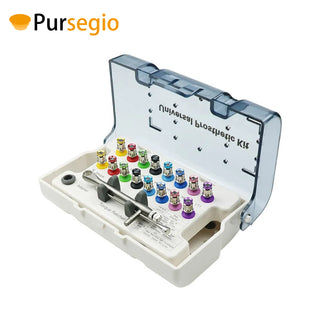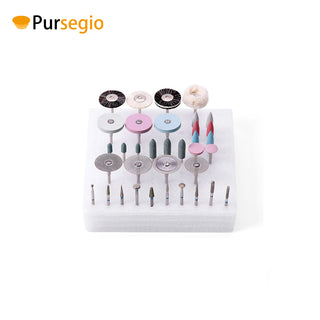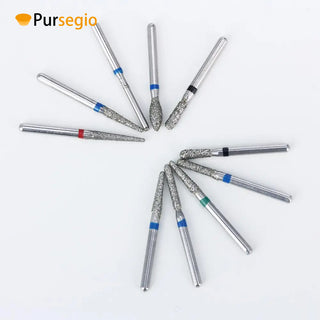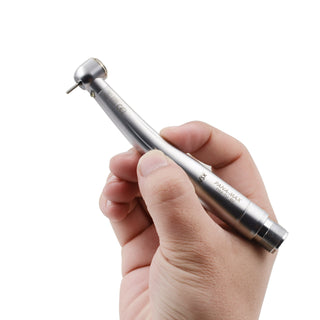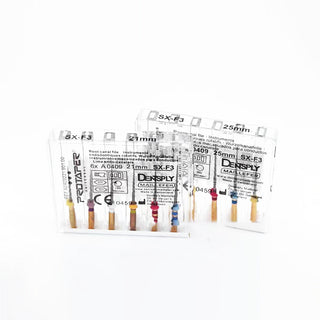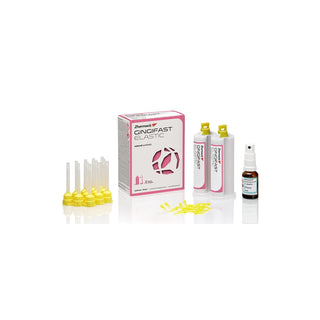5001706-ISO 289 191 023 Tungsten Carbide Burs for Trimming Metal
- Unit price
- / per
Warnings and Precautions when using Carbide Burs
General recommendations
- Carbide burs should be used by dentists, lab technicians or licensed professionals.
- Carefully read package labels before use.
- Don’t use worn-out or dull burs.
- Before use, ensure the bur is fully seated and securely gripped in the handpiece collet.
- Don’t force the bur into the handpiece. In any case of difficult access, check both for troubleshooting.
- Don’t apply excessive pressure as it could cause undesirable heat or may cause the bur to fail.
- Avoid removing the bur at too sharp an angle to avoid leverage and breakage.
- It is recommended to move the bur continuously to avoid heating or damage.
- For maximum effectiveness, only use handpieces in a good working condition.
- Use a rubber dental dam to avoid possible aspiration or swallowing.
- Always wear gloves when handling contaminated instruments.
- Always wear eye protection to protect against eject particles.
- Always wear surgical masks to avoid inhalation of any aerosol or dust.
- Bur blocks are used for storage and steam sterilization. They are not intended to maintain sterility of the burs.
- It is recommended to transport the burs dry to protect them from staining or corrosion.
Speed of work (RPM)
Always pay attention to the carbides speed of work (RPM). Check the packaging or consult with the manufacturer to ensure you don’t exceed the maximum recommended RPM.
Operating a carbide bur with too high speed may cause cause the bur to fail and may generate undesirable heat.
How to clean carbide burs
- Dental carbide burs are mechanically cleansed but not sterile, therefore they should be thoroughly cleaned and steam-sterilized prior to each use.
- Don’t dry heat to sterilize the carbide burs, as these processes have not been validated for use.
- Don’t use cleaning agents containing chlorine or chloride as the active ingredient are corrosive to stainless steel. Use neutral pH agents instead.
- Don’t use cold sterilization methods as they often contain strong oxidizing chemicals that may dull or weaken the carbide burs.
- Inspect the burs carefully for defects during the cleaning process.
- Avoid prolonged storage in disinfectant solutions as they may cause a degradation of the product.
Sterile carbide burs
- For obvious reasons, sterile carbide burs should be cleaned only after the first use.
- If the sterile carbide burs package is opened or damages, consider the burs as non sterile.
How to manually clean carbide burs
Hand cleaning is the least recommended option. If that's the only option, do it in a sink restricted for cleaning instruments.
- Rinse the carbide burs under cool running water for at least one minute.
- Use a fresh bath of neautral-pH cleaning solution and follow the agent’s manufactures instructions.
- Immerse the burs and soak them for at least ten minutes.
- While immersed, brush thoroughly away from the body using the cleaning agent for at least one minute.
- Don’t spray or splash during the brushing process to avoid spreading contaminants.
- Use wire brushes with caution as brass particles may result in galvanic corrosion and steel particles may cause discoloration of stainless steel.
- Pay special attention when cleaning crevices and other hard-to-reach areas thoroughly.
- Visually inspect to confirm the removal of debris. Repeat the cycle if needed.
- Thoroughly rinse the burs and bur blocks under running warm water for at least one minute and until they are visibly clean.
- Dry the burs using clean compressed air or a non-shedding wipe.
How to clean carbide burs using ultrasonic procedure
- Prepare a fresh pH-neutral cleaning solution
- Place the carbide burs in a sonication unit.
- Follow the agent manufacturers' instructions for correct concentration, exposure time, temperature, and water quality.
- Completely submerge it in the cleaning solution and sonicate for at least fifteen minutes.
- Perform a final thorough rinse under running warm tap water for at least one minute.
- Inspect visually to confirm the removal of debris and repeat the cycle if needed.
- Dry it using clean compressed air or by using a non-shedding wipe.
How to inspect carbide burs after cleaning
- Carefully inspect each bur to ensure that all debris has been removed.
- Visually inspect the burs for damage or wear that would prevent proper operation.
- Do not use if the tip is broken.
- Do not use if there is a broken section of a flute.
- Do not use if there is evidence of corrosion.
5001706-ISO 289 191 023 Tungsten Carbide Burs for Trimming Metal
- Unit price
- / per
The displayed price is the original price, and the discount will be automatically deducted when you check out.
Adding product to your cart
You may also like
Warnings and Precautions when using Carbide Burs
General recommendations
- Carbide burs should be used by dentists, lab technicians or licensed professionals.
- Carefully read package labels before use.
- Don’t use worn-out or dull burs.
- Before use, ensure the bur is fully seated and securely gripped in the handpiece collet.
- Don’t force the bur into the handpiece. In any case of difficult access, check both for troubleshooting.
- Don’t apply excessive pressure as it could cause undesirable heat or may cause the bur to fail.
- Avoid removing the bur at too sharp an angle to avoid leverage and breakage.
- It is recommended to move the bur continuously to avoid heating or damage.
- For maximum effectiveness, only use handpieces in a good working condition.
- Use a rubber dental dam to avoid possible aspiration or swallowing.
- Always wear gloves when handling contaminated instruments.
- Always wear eye protection to protect against eject particles.
- Always wear surgical masks to avoid inhalation of any aerosol or dust.
- Bur blocks are used for storage and steam sterilization. They are not intended to maintain sterility of the burs.
- It is recommended to transport the burs dry to protect them from staining or corrosion.
Speed of work (RPM)
Always pay attention to the carbides speed of work (RPM). Check the packaging or consult with the manufacturer to ensure you don’t exceed the maximum recommended RPM.
Operating a carbide bur with too high speed may cause cause the bur to fail and may generate undesirable heat.
How to clean carbide burs
- Dental carbide burs are mechanically cleansed but not sterile, therefore they should be thoroughly cleaned and steam-sterilized prior to each use.
- Don’t dry heat to sterilize the carbide burs, as these processes have not been validated for use.
- Don’t use cleaning agents containing chlorine or chloride as the active ingredient are corrosive to stainless steel. Use neutral pH agents instead.
- Don’t use cold sterilization methods as they often contain strong oxidizing chemicals that may dull or weaken the carbide burs.
- Inspect the burs carefully for defects during the cleaning process.
- Avoid prolonged storage in disinfectant solutions as they may cause a degradation of the product.
Sterile carbide burs
- For obvious reasons, sterile carbide burs should be cleaned only after the first use.
- If the sterile carbide burs package is opened or damages, consider the burs as non sterile.
How to manually clean carbide burs
Hand cleaning is the least recommended option. If that's the only option, do it in a sink restricted for cleaning instruments.
- Rinse the carbide burs under cool running water for at least one minute.
- Use a fresh bath of neautral-pH cleaning solution and follow the agent’s manufactures instructions.
- Immerse the burs and soak them for at least ten minutes.
- While immersed, brush thoroughly away from the body using the cleaning agent for at least one minute.
- Don’t spray or splash during the brushing process to avoid spreading contaminants.
- Use wire brushes with caution as brass particles may result in galvanic corrosion and steel particles may cause discoloration of stainless steel.
- Pay special attention when cleaning crevices and other hard-to-reach areas thoroughly.
- Visually inspect to confirm the removal of debris. Repeat the cycle if needed.
- Thoroughly rinse the burs and bur blocks under running warm water for at least one minute and until they are visibly clean.
- Dry the burs using clean compressed air or a non-shedding wipe.
How to clean carbide burs using ultrasonic procedure
- Prepare a fresh pH-neutral cleaning solution
- Place the carbide burs in a sonication unit.
- Follow the agent manufacturers' instructions for correct concentration, exposure time, temperature, and water quality.
- Completely submerge it in the cleaning solution and sonicate for at least fifteen minutes.
- Perform a final thorough rinse under running warm tap water for at least one minute.
- Inspect visually to confirm the removal of debris and repeat the cycle if needed.
- Dry it using clean compressed air or by using a non-shedding wipe.
How to inspect carbide burs after cleaning
- Carefully inspect each bur to ensure that all debris has been removed.
- Visually inspect the burs for damage or wear that would prevent proper operation.
- Do not use if the tip is broken.
- Do not use if there is a broken section of a flute.
- Do not use if there is evidence of corrosion.
You may also like
You may also like
Testimonials

I have been cooperating with Pursegio for three years. Their products are of very stable and high quality.

Pursegio has a very professional team of sales managers who can solve the product problems I encountered

lingotins parfaits, aucune couche de réaction après le démoulage donc inutile de passer les éléments dans le bain. j'ai monté directement la céramique et c'est parfait 👍 je reviendrai ❤️

The logistics speed is very fast. I usually receive the products I ordered within a week after placing the order. I recommend this brand.
Recommended products
We support PayPal and major credit card payments and accept government supervision
We will respond to your pre-sales and after-sales needs within 24 hours
Most areas can be delivered within 10-20 working days
Our customer information is subject to supervision by EU authorities

